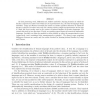Free Online Productivity Tools
i2Speak
i2Symbol
i2OCR
iTex2Img
iWeb2Print
iWeb2Shot
i2Type
iPdf2Split
iPdf2Merge
i2Bopomofo
i2Arabic
i2Style
i2Image
i2PDF
iLatex2Rtf
Sci2ools
103
click to vote
ALT
1998
Springer
1998
Springer
Learning with Refutation
In their pioneering work, Mukouchi and Arikawa modeled a learning situation in which the learner is expected to refute texts which are not representative of L, the class of languages being identified. Lange and Watson extended this model to consider justified refutation in which the learner is expected to refute texts only if it contains a finite sample unrepresentative of the class L. Both the above studies were in the context of indexed families of recursive languages. We extend this study in two directions. Firstly, we consider general classes of recursively enumerable languages. Secondly, we allow the machine to either identify or refute the unrepresentative texts (respectively, texts containing finite unrepresentative samples). We observe some surprising differences between our results and the results obtained for learning indexed families by Lange and Watson.
ALT 1998 | Indexed Families | Machine Learning | Refute | Texts |
Related Content
| Added | 05 Aug 2010 |
| Updated | 05 Aug 2010 |
| Type | Conference |
| Year | 1998 |
| Where | ALT |
| Authors | Sanjay Jain |
Comments (0)

